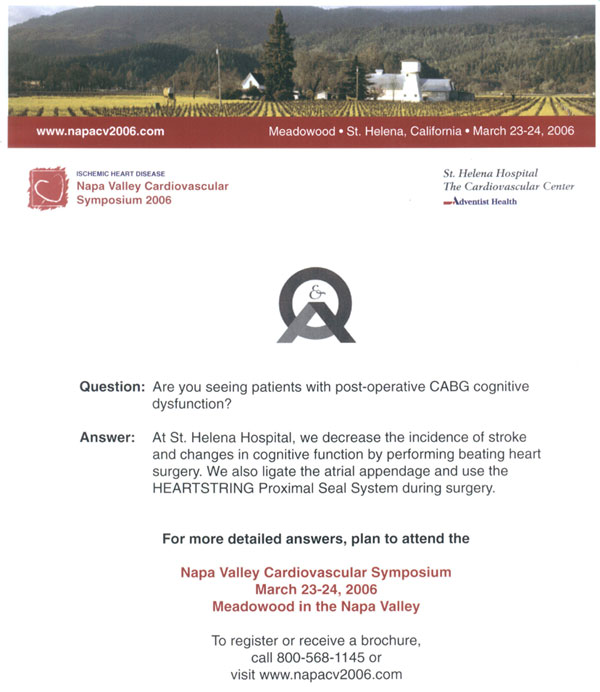YouÕll Get the Truth Only If There Is Money To Be Made: Bypass Surgery
You’ll Get the Truth Only If There Is Money To Be Made
A letter from the Cardiovascular Center of St. Helena Hospital reminded me of how patients learn the truth. (St. Helena Hospital in Napa Valley California was the location of my clinic for 16 years from 1986 to 2002.)
Here is what the letter said:
Question: Are you seeing patients with post-operative CABG cognitive dysfunction?
Answer: At St. Helena Hospital, we decrease the incidence of stroke and changes in cognitive function by performing beating heart surgery.
In other words, your patients’ brains will be less damaged (cognitive dysfunction) by our new procedure (beating heart surgery) compared to the traditional bypass surgery (CABG = Coronary Artery Bypass Grafting). Patients who see this letter should be asking, ‘What brain damage? How come I never knew bypass surgery caused brain damage?

The first time I wrote about the brain damage caused by the heart-lung machine (the bypass pump) used in all traditional bypass operations was in my book McDougall’s Medicine—A Challenging Second Opinion, published over 20 years ago (1985). I would estimate that since then more than 7 million people in the US alone have suffered brain damage—and hardly a single one of them was ever informed of this universal complication prior to having the operation.
For more than 20 years I have been talking on radio and TV, and writing about this closely guarded medical secret. In that time I have never met a patient who had been informed that he or she was likely to never be the same after spending time on the pump. Over the years I have confronted many heart surgeons and cardiologists—all have minimized the importance of this damage and many have denied it even occurs—denied it to me and to their patients. The deception ends now with the introduction of a new medical business, ‘off-pump’ beating heart surgery. This surgery repairs the heart arteries without stopping the heart and without placing the patient on the bypass pump.
Research Compares Procedures
The December 20/27, 2005 issue of the American Heart Association journal Circulation published the most recent findings on the brain-damaging complications of bypass surgery. Researchers compared the brain after the traditional bypass (which uses the pump) with the brain after the ‘off-pump’ (beating heart) surgery by examining the blood vessels in the back of the patients’ eyes (retinas) for damage (emboli, leaks, hemorrhages, etc.). Of those who were on the pump, 5 of 9 patients had damage, whereas none of those undergoing heart surgeries without the use of the pump had eye damage.
The eye is an extension of the brain; therefore these findings reflect injury that occurs throughout the brain. This damage is caused by embolization of bits of debris (emboli) released during the bypass surgery. Examining an artery that supplies the brain (the middle cerebral artery) with an ultrasound machine, doctors could ‘see’ this debris 20.3 times more frequently during ‘on-pump’ bypass surgery than during the ‘off-pump’ procedure.
Is Heart Surgery Worth It?
The July 18, 2005 issue of Business Week magazine ran an article, ‘Is Heart Surgery Worth It?’ that should be required reading before anyone is allowed to agree to heart surgery for blocked heart arteries (coronary artery disease). This article talks about the failure of bypass surgery to save lives in most cases, and about complications, including the brain damage. Dr. Nortin M. Hadler, professor of medicine at the University of North Carolina at Chapel Hill and author of The Last Well Person, is quoted in this article as saying, ‘Bypass surgery should have been relegated to the archives 15 years ago.’
You can find this article online at the Business Week web site:
http://www.businessweek.com/@@EIDaaoQQMOesihsA/magazine/content/05_29/b3943037_mz011.htm
Follow the Money
Brain damage from bypass surgery is just one example of how people usually learn medical information. Count on some business making lots of money before you hear about it. The importance of cholesterol became well known in order to sell billions of dollars worth of ‘statin’ drugs. The marketing of dairy products, calcium pills, and HRT (hormones) led to osteoporosis becoming a household word. GERD (gastroesophageal reflux disease) is a familiar word thanks to the antacid industry—now we are all too well acquainted with our refluxing stomach acids. The list is endless. You need to protect yourself and your family by following the money trail. Next time you hear something new, at least ask, who benefits by me knowing this information? And always be asking, ‘How do I really solve my health problems and avoid the medical businesses?’ The bottom line is self-care—diet and lifestyle.
Recommended Articles

The Real Coconut Oil Miracle: How a High-Fat, High-Calorie Condiment Became a “Superfood”

The Myth of Moderation: Do All Foods Really Fit?






Join the Conversation!
Have a question, a helpful tip, or a story from your journey? Add it below - your voice matters.